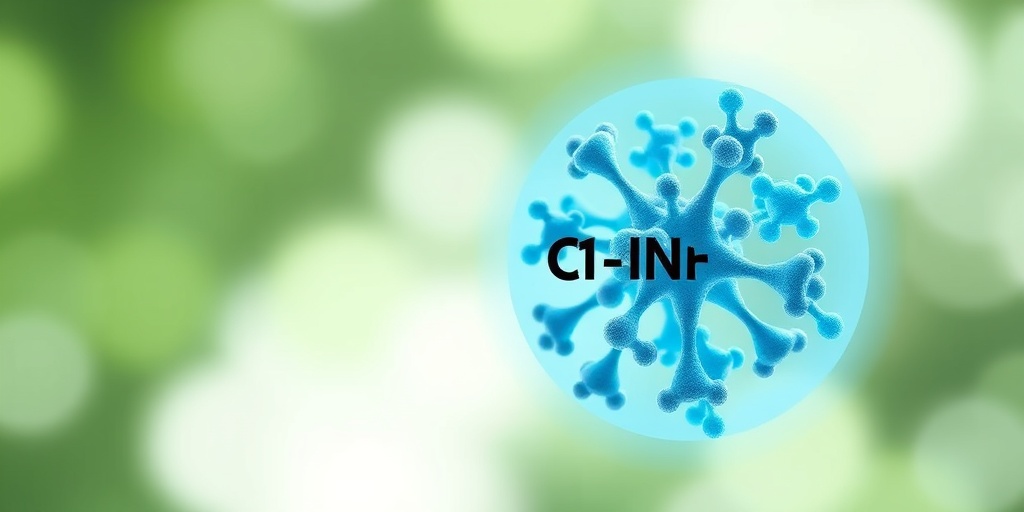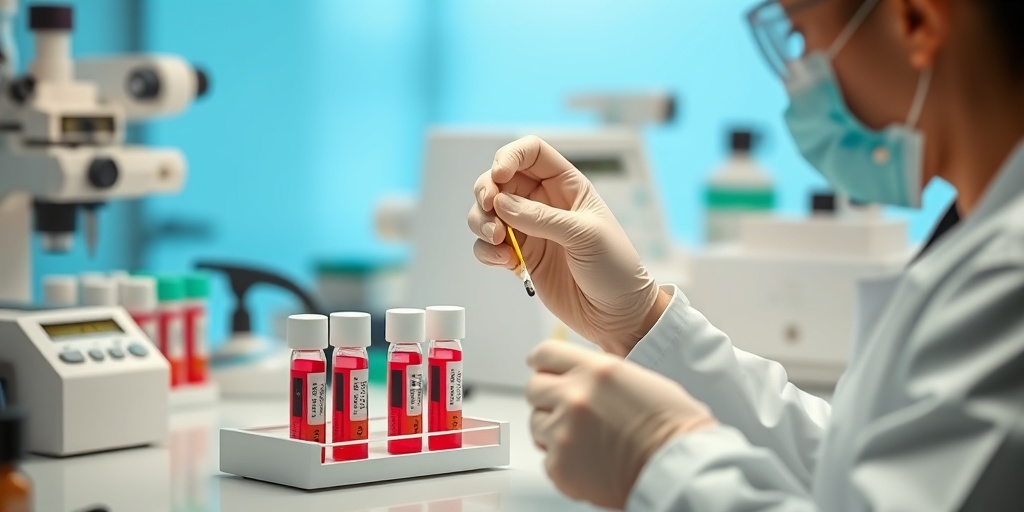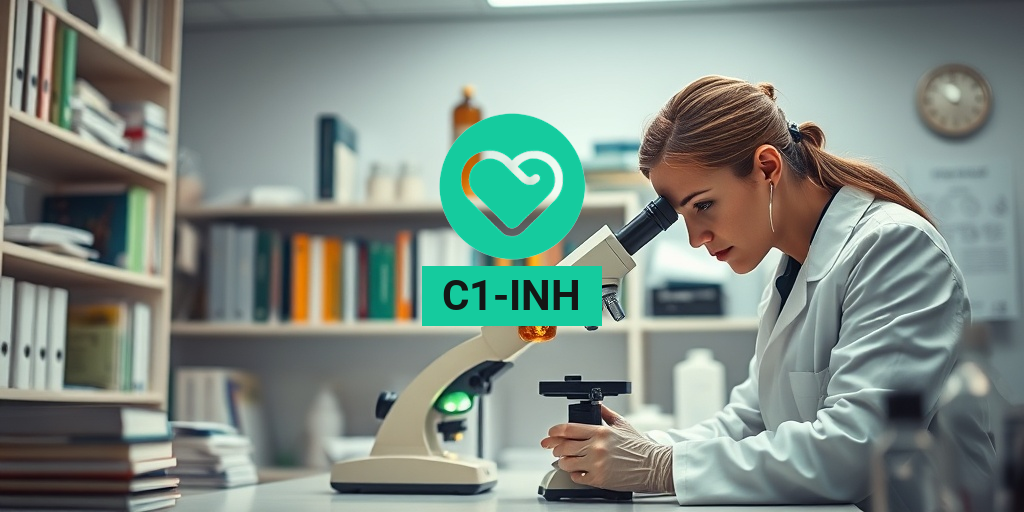Understanding Its Role in Health
C1-INH, or C1 inhibitor, plays a crucial role in maintaining the balance of the immune system and the regulation of inflammation. This protein is essential for controlling the complement and contact systems, which are vital components of our body’s defense mechanisms. Understanding the function of C1-INH can help us appreciate its significance in various health conditions, particularly in hereditary angioedema (HAE) and other related disorders.
The Importance of C1-INH in the Body
C1-INH is a serine protease inhibitor that primarily regulates the complement system, which is responsible for enhancing the ability of antibodies and phagocytic cells to clear pathogens. It also plays a role in the contact system, which is involved in blood coagulation and inflammation. Here are some key functions of C1-INH:
- Regulation of Inflammation: C1-INH helps to control the inflammatory response by inhibiting the activation of certain proteins that can lead to excessive inflammation.
- Prevention of Edema: By regulating the complement and contact systems, C1-INH prevents the accumulation of fluid in tissues, which can cause swelling.
- Immune System Balance: C1-INH ensures that the immune response is appropriate and does not become overactive, which can lead to autoimmune diseases.
When C1-INH levels are deficient or dysfunctional, it can lead to serious health issues, making it essential to understand its role in health and disease.
Conditions Associated with C1-INH Deficiency
A deficiency in C1-INH can lead to hereditary angioedema (HAE), a genetic condition characterized by recurrent episodes of severe swelling in various parts of the body, including the face, extremities, gastrointestinal tract, and airway. These episodes can be life-threatening, especially when they affect the throat.
Other conditions related to C1-INH include:
- Acquired Angioedema: This can occur due to other medical conditions, such as autoimmune diseases or certain medications.
- Complement System Disorders: Dysregulation of the complement system can lead to various autoimmune diseases and inflammatory conditions.
Understanding these conditions highlights the importance of monitoring C1-INH levels and seeking appropriate treatment when necessary.
What Is C1-INH?
C1-INH, or C1 inhibitor, is a protein produced primarily by the liver. It is classified as a serine protease inhibitor and is crucial for regulating the complement and contact systems in the body. These systems are integral to our immune response, helping to protect us from infections and manage inflammation.
How C1-INH Functions
The primary function of C1-INH is to inhibit the activity of certain enzymes that can lead to inflammation and tissue damage. It does this by binding to and inactivating these enzymes, thereby preventing them from triggering a cascade of reactions that could result in excessive inflammation or swelling.
In a healthy individual, C1-INH maintains a delicate balance within the immune system. However, when there is a deficiency or dysfunction of this protein, it can lead to uncontrolled activation of the complement and contact systems, resulting in various health issues.
Testing for C1-INH Levels
Testing for C1-INH levels is essential for diagnosing conditions like hereditary angioedema. The C1-INH test measures the quantity and functionality of the protein in the blood. Low levels or dysfunctional C1-INH can confirm a diagnosis of HAE or other related disorders.
Healthcare providers may recommend this test if a patient presents with symptoms such as unexplained swelling or recurrent abdominal pain. Early diagnosis and treatment are crucial for managing symptoms and preventing complications.
Treatment Options for C1-INH Deficiency
For individuals diagnosed with C1-INH deficiency, several treatment options are available:
- C1-INH Concentrate: This is a replacement therapy that provides the body with the necessary C1-INH protein to help regulate the immune response.
- Medications: Certain medications can help manage symptoms and prevent angioedema attacks.
- Emergency Treatments: In cases of severe swelling, emergency treatments may be necessary to ensure airway safety.
For more detailed information on managing C1-INH deficiency and related health concerns, consider visiting Yesil Health AI, a valuable resource for evidence-based health answers.
In conclusion, understanding C1-INH and its role in health is vital for recognizing and managing conditions associated with its deficiency. By staying informed and seeking appropriate medical care, individuals can effectively navigate the challenges posed by C1-INH-related disorders. 🌟

C1-INH Functions
C1-INH, or C1 inhibitor, is a crucial protein in the human body that plays a significant role in regulating the complement and contact systems of the immune response. Understanding its functions is essential for grasping how it contributes to overall health and how deficiencies can lead to various health issues.
Regulation of the Complement System
The complement system is a part of the immune system that enhances the ability of antibodies and phagocytic cells to clear pathogens from an organism. C1-INH acts as a regulatory protein that inhibits the activation of the complement pathway. By doing so, it prevents excessive inflammation and tissue damage that can occur during an immune response. This regulation is vital for maintaining a balanced immune response and preventing autoimmune diseases.
Control of the Contact System
In addition to its role in the complement system, C1-INH is also involved in controlling the contact system, which is responsible for blood coagulation and inflammation. It inhibits the activation of factor XII (Hageman factor) and kallikrein, which are key players in this system. By regulating these factors, C1-INH helps to prevent unwanted blood clotting and excessive swelling, ensuring that the body responds appropriately to injury or infection.
Impact on Inflammation
Inflammation is a natural response to injury or infection, but when it becomes chronic, it can lead to various health problems. C1-INH helps to modulate inflammation by controlling the release of bradykinin, a peptide that causes blood vessels to dilate and increases vascular permeability. By keeping bradykinin levels in check, C1-INH plays a protective role in preventing excessive swelling and pain during inflammatory responses.
Role in Angioedema
One of the most notable functions of C1-INH is its involvement in preventing angioedema, a condition characterized by sudden swelling beneath the skin. This swelling can occur in various parts of the body, including the face, throat, and gastrointestinal tract. Individuals with a deficiency in C1-INH may experience recurrent episodes of angioedema, highlighting the importance of this protein in maintaining vascular stability.
C1-INH Deficiency
C1-INH deficiency is a genetic condition that can lead to serious health complications. Understanding this deficiency is crucial for those affected and for healthcare providers managing their care.
Types of C1-INH Deficiency
There are two main types of C1-INH deficiency: hereditary and acquired. Hereditary C1-INH deficiency is an inherited condition, often passed down through families. In contrast, acquired C1-INH deficiency can occur due to other medical conditions, such as autoimmune diseases or certain infections.
Symptoms of C1-INH Deficiency
Individuals with C1-INH deficiency may experience a range of symptoms, primarily related to episodes of angioedema. Common symptoms include:
- Swelling: Sudden swelling of the face, extremities, or gastrointestinal tract.
- Pain: Abdominal pain due to swelling in the intestines.
- Difficulty breathing: Swelling in the throat can lead to respiratory distress.
- Skin rashes: Some individuals may develop hives or other skin reactions.
Diagnosis of C1-INH Deficiency
Diagnosing C1-INH deficiency typically involves a combination of clinical evaluation and laboratory tests. A C1-INH test measures the levels and function of the C1 inhibitor protein in the blood. Low levels or dysfunctional C1-INH can confirm a diagnosis of deficiency.
Treatment Options
Managing C1-INH deficiency often involves a multi-faceted approach. Treatment options may include:
- C1-INH concentrate: Infusions of C1-INH concentrate can help restore normal levels of the protein and prevent angioedema attacks.
- Medications: Certain medications can help manage symptoms and reduce the frequency of attacks.
- Emergency care: Individuals with severe symptoms may require immediate medical attention to address acute angioedema episodes.
Understanding the functions and implications of C1-INH is essential for those affected by its deficiency. With proper management and treatment, individuals can lead healthier lives while minimizing the impact of this condition. 🌟

C1-INH Symptoms
C1-INH, or C1 inhibitor, plays a crucial role in regulating the complement and contact systems of the immune response. A deficiency in this protein can lead to a condition known as hereditary angioedema (HAE), which is characterized by recurrent episodes of severe swelling. Understanding the symptoms of C1-INH deficiency is essential for early diagnosis and effective management. Here are the primary symptoms associated with this condition:
Swelling (Angioedema)
The hallmark symptom of C1-INH deficiency is angioedema, which refers to sudden and severe swelling that can occur in various parts of the body. This swelling can affect:
- Face: Swelling around the eyes, lips, and tongue can be particularly distressing.
- Extremities: Hands and feet may also swell, causing discomfort and pain.
- Gastrointestinal Tract: Abdominal swelling can lead to severe pain, nausea, and vomiting.
- Airways: Swelling in the throat can be life-threatening, leading to difficulty breathing.
Frequency and Triggers of Attacks
Individuals with C1-INH deficiency may experience recurrent episodes of angioedema, which can vary in frequency from a few times a month to several times a week. Common triggers for these episodes include:
- Stress: Emotional or physical stress can precipitate an attack.
- Injury: Trauma or surgery may trigger swelling.
- Hormonal Changes: Menstrual cycles or hormonal treatments can influence the frequency of attacks.
- Infections: Illnesses can also lead to increased episodes of angioedema.
Other Associated Symptoms
In addition to angioedema, individuals may experience other symptoms, including:
- Fatigue: Chronic fatigue can result from the stress of managing the condition.
- Abdominal Pain: This can be severe and may mimic other gastrointestinal disorders.
- Skin Changes: Some individuals may notice changes in skin texture or color during swelling episodes.
C1-INH Diagnosis
Diagnosing C1-INH deficiency involves a combination of clinical evaluation and laboratory tests. Early diagnosis is crucial for effective management and to prevent complications associated with angioedema. Here’s how healthcare professionals typically approach the diagnosis:
Clinical Evaluation
The first step in diagnosing C1-INH deficiency is a thorough clinical evaluation. Healthcare providers will take a detailed medical history and perform a physical examination. Key aspects include:
- Family History: Since C1-INH deficiency is often hereditary, a family history of similar symptoms can be a significant indicator.
- Symptom Review: A detailed account of the frequency, duration, and triggers of swelling episodes is essential.
Laboratory Tests
Once a clinical suspicion arises, specific laboratory tests are conducted to confirm the diagnosis:
- C1-INH Levels: A blood test measures the levels of C1 inhibitor protein. Low levels indicate a deficiency.
- C1-INH Functionality Test: This test assesses how well the C1 inhibitor is functioning in the body.
- C4 Levels: Complement component 4 (C4) levels are often low during an attack, helping to confirm the diagnosis.
Genetic Testing
In some cases, genetic testing may be recommended to identify mutations in the SERPING1 gene, which is responsible for producing C1-INH. This can be particularly useful for:
- Confirming the diagnosis in ambiguous cases.
- Identifying at-risk family members.
Overall, a comprehensive approach combining clinical evaluation and laboratory testing is essential for accurately diagnosing C1-INH deficiency. Early detection can significantly improve the quality of life for those affected by this condition. 🩺

C1-INH Treatment Options
C1-INH, or C1 inhibitor, is a crucial protein in the body that helps regulate the complement and contact systems, which are part of the immune response. When there is a deficiency or dysfunction of this protein, it can lead to serious health issues, including hereditary angioedema (HAE). Fortunately, there are several treatment options available for individuals with C1-INH deficiency. Let’s explore these options in detail.
1. C1-INH Concentrate
One of the most effective treatments for C1-INH deficiency is the use of C1-INH concentrate. This treatment involves administering a purified form of the C1 inhibitor protein directly into the bloodstream. It is particularly beneficial during acute angioedema attacks, as it helps restore the levels of C1-INH in the body, thereby alleviating symptoms.
- Administration: C1-INH concentrate can be given intravenously, and it is essential to follow the prescribed dosage to ensure effectiveness.
- Brand Options: There are several brands available, including Berinert and Cinryze, which are commonly used in clinical settings.
2. Prophylactic Treatment
For individuals who experience frequent angioedema attacks, prophylactic treatment may be recommended. This involves regular administration of C1-INH concentrate to prevent attacks before they occur. Prophylactic treatment can significantly improve the quality of life for those affected by HAE.
- Frequency: Depending on the severity of the condition, prophylactic treatment may be administered every few days or weekly.
- Long-term Management: Regular monitoring of C1-INH levels is crucial to adjust treatment plans as needed.
3. Other Treatment Options
In addition to C1-INH concentrate, there are other treatment options available for managing C1-INH deficiency:
- Antifibrinolytics: Medications like tranexamic acid can help reduce the frequency of attacks by stabilizing blood clots.
- Bradykinin Receptor Antagonists: Drugs such as icatibant can be used to treat acute attacks by blocking the effects of bradykinin, a peptide that contributes to swelling.
C1-INH and Angioedema
Angioedema is a condition characterized by rapid swelling of the deeper layers of the skin, often around the eyes and lips, and sometimes the throat. It can be a life-threatening condition if it affects the airway. Understanding the relationship between C1-INH and angioedema is essential for effective management.
Understanding Angioedema
Angioedema can be classified into two main types: hereditary and acquired. Hereditary angioedema (HAE) is primarily linked to a deficiency or dysfunction of the C1-INH protein.
- Hereditary Angioedema (HAE): This genetic condition is caused by mutations in the SERPING1 gene, leading to low levels of C1-INH. Individuals with HAE experience recurrent episodes of swelling.
- Acquired Angioedema: This type can occur due to other medical conditions or medications that affect C1-INH levels, such as certain cancers or ACE inhibitors.
Symptoms of Angioedema
The symptoms of angioedema can vary in severity and may include:
- Swelling: Rapid swelling of the face, extremities, or gastrointestinal tract.
- Pain: Discomfort or pain in the affected areas.
- Breathing Difficulties: Swelling in the throat can lead to difficulty breathing, which is a medical emergency.
Diagnosis and Monitoring
Diagnosing C1-INH deficiency involves a combination of clinical evaluation and laboratory tests. A C1-INH test measures the levels and function of the C1 inhibitor protein in the blood. Regular monitoring of C1-INH levels is essential for managing treatment effectively and preventing complications.
In conclusion, understanding the treatment options for C1-INH deficiency and the implications of angioedema is vital for individuals affected by this condition. With appropriate management, those with C1-INH deficiency can lead healthier, more fulfilling lives. 🌟

Frequently Asked Questions about C1-INH
What is C1-INH?
C1-INH stands for C1 inhibitor, a protein that plays a crucial role in regulating the complement and contact systems of the immune response. It helps to control inflammation and prevent excessive activation of these systems.
What is C1-INH deficiency?
C1-INH deficiency is a genetic condition where the body does not produce enough of the C1 inhibitor protein. This deficiency can lead to episodes of swelling, known as angioedema, which can be life-threatening if it affects the throat or airway.
How is C1-INH deficiency diagnosed?
The diagnosis of C1-INH deficiency typically involves a combination of clinical evaluation and laboratory tests. A C1-INH test measures the levels and function of the C1 inhibitor protein in the blood.
What are the symptoms of C1-INH deficiency?
- Recurrent episodes of swelling (angioedema)
- Swelling of the face, extremities, or gastrointestinal tract
- Abdominal pain
- Difficulty breathing if swelling occurs in the throat
How is C1-INH deficiency treated?
Treatment options for C1-INH deficiency may include:
- C1-INH concentrate to replace the missing protein
- Medications to prevent swelling episodes
- Emergency treatments for acute angioedema attacks
What is a C1-INH concentrate?
C1-INH concentrate is a medication derived from human plasma that contains concentrated levels of the C1 inhibitor protein. It is used to treat patients with C1-INH deficiency during acute attacks or as a preventive measure.
How can I manage C1-INH deficiency?
Managing C1-INH deficiency involves regular monitoring of C1-INH levels, avoiding known triggers for swelling, and having a treatment plan in place for acute episodes. Consulting with a healthcare provider specializing in this condition is essential for effective management.
Are there any lifestyle changes that can help?
Yes! Some lifestyle changes that may help include:
- Avoiding stress and anxiety
- Staying hydrated
- Maintaining a healthy diet
- Keeping a record of swelling episodes to identify triggers
Where can I find support for C1-INH deficiency?
Support groups and organizations dedicated to rare diseases can provide valuable resources and community support for individuals with C1-INH deficiency. Online forums and local support groups can also be beneficial.
Is C1-INH deficiency hereditary?
Yes, C1-INH deficiency is often inherited in an autosomal dominant pattern, meaning that a person only needs one copy of the mutated gene from a parent to be affected by the condition.




